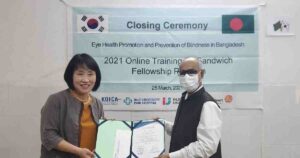– GreenWatch Dhaka Special

Hungry and thirsty people want something to eat, those exposed to rain and the Sun, run for shelter, the tried ones desperately need rest and recreation; likewise after falling ill or feeling Physical discomfort, they start searching for medicine.
For survival man made use of available herbs, trees, their branches, leaves, flowers and fruits which resulted sometimes in complete cure, sometimes also caused death.
Medicines or herbs yielding desired relief or results were remembered for future reference. Thus this natural way of healing was transferred from person to person, place to place and from generation to generation. Physicians or guides were respected almost as apostles of ‘God’.
In Bangladesh the popularity of traditional or alternative medicines – Unani and Ayurvedic -have been increasing gradually and at a faster pace since 1980. Their annual market share is expected to exceed Tk 2,500 crore (Taka 2.5 billion) by 2020, herbalists predict.
The annual sale of herbal medicines rose to Tk 1,000 crore (one billion Taka) in 2010 against only Tk 1 crore (Taka 10 million) in 1980. Industry insiders said the allopathic pharma market in Bangladesh is worth around Tk 4,000 crore (4 billion), four times larger than the market size for herbal medicines including Unani and Ayurvedic.
Bangladesh Unani Association Chairman and Managing Director , Hamdard Laboratories (Waqf) Bangladesh Hakim M Yusuf Harun Bhuiyan said about 80 percent of population in Bangladesh depend on traditional alternative medicines. Worldwide about 400 crore people depend on such medicines even though the allopathic medical science has excelled.
Hakim Yusuf Harun has pointed out that traditional medicines use locally grown herbs for raw materials and are affordable. Promotion of traditional medicine will increase the production of herbs and with it job opportunity.
Terming Unani and Ayurvedic medicines as pro-poor systems he said, they should be introduced in general hospitals with special training to hospital staffs. This will decrease extra pressure on specialised hospitals in introducing the traditional medicines, he said.
Hakim Yusuf Harun said the use of natural medicine, free from side effects, should be increased to ensure sound health for all. The government has recognised the production of herbal medicine as industry. The country spends a large amount of foreign currency to import raw material for allopathic medicine production which can be curtailed by promoting traditional medicines.
“The government should provide required policy support to help flourish the Unani and Ayurvedic medicine industry.” Bangladesh can earn valuable foreign exchange and create jobs through further expansion of the industry, Hakim Yusuf Harun aded.
Hamdard is an institution of Eastern System of Medicine dedicated to health care, and education and a movement for the promotion of morality, science and culture. Hamdard benefits from the accumulated knowledge of centuries, blends it with the latest scientific technology and converts it into efficacious herbal medicine to cure the sufferings of mankind all over the world.
Hamdard Bangladesh is the popular Unani medicine manufacturing company reorganised after liberation war. The Hamdard story had begun in 1906, when Hakim Hafiz Abdul Majeed, set up a small drug shop in Delhi. What started as a health service later diversified into an education and a socio-cultural movement in the shape of a charity.
The development of Eastern System of Medicine during the entire 20th century owes its vitality to the two towering figures in the persons of Hakeem Abdul Hameed and Hakim Mohammed Said, two sons of Hakim Hafiz Abdul Majeed, who who lived in India and Pakistan, and achieved worldwide fame as founders and patrons of the Hamdard.
Hamdard published first Pharmacopoeia in the field of Eastern Medicine titled as “Hamdard Pharmacopoeia of Eastern Medicine” and Hamdard has given birth to an entirely new discipline in medicine “Medical Element logy”, which investigates the role of elements in the human body on health and diseases.
In Dhaka, Bangladesh Hamdard was established in 1953. The development of Hamdard Bangladesh was going on step by step slowly. Hakim Md. Yousuf Harun Bhuiyan, took over the responsibility of Hamdard Bangladesh in 1982, who was blessed with love and affection of Hakim Said. By virtue of the versatility of Hakim Yusuf Harun, Hamdard Bangladesh started recording tremendous growth and development.
A new dynamism came to the organisation within a short time and Hamdard becme very popular in the country and abroad for its multipurpose humanitarian activities. Hakim Yousuf Harun Bhuiyan made a breakthrough in Bangladesh by his success in obtaining official recognition of herbal medicine. His utmost effort made it possible to reintroduce Eastern Medicine as the bridge between traditional medicine and modern medicine.
At present, both modern physicians and traditional physicians prescribe Hamdard medicine in their routine practice. Hamdard Bangladesh has introduced time honored presentation of herbal medicine like capsule, tablet, syrup, ointment, elixir among others.
To maintain the highest standards of production Hamdard Bangladesh has setup laboratories with modern scientific equipment, run by qualified experts. Hamdard has established a holistic quality management system to check every step of production and marketing, right from the procurement of raw materials, in-process quality control, finished goods quality assurance and post delivery customer service.
Hamdard has established about 200 medical centers all over the country. The medical centers charge no fees for consultation and examination, tests and services. The patient only pays for medicine. Indigent patients are given all treatment and medicines free.
The journey of Hamdard started with great confidence and faith, and continues with the same zeal and devotion. After a century, Hamdard stands as a model of substantial success and a high quality accomplishment. Hamdard earns to spend in the pursuance of noble objectives. Hamdard Foundation is trying to build different educational institutions.
Hakim Yusuf Harun underscores the need for reform of policies in different medical institutions of the country, establishment of a separate council and a training centre for alternative medicine. Quality control of the alternative medicines is also necessary.
According to the World Health Organisation (WHO), as many as 80 percent of world’s people rely on traditional medicines for their primary healthcare and remedies, and the use of traditional medicines is rising in the developed economies such as Europe and America.
Industry people say the global market for medicinal plant products is estimated at more than $60 billion a year. At present, China and India supply bulk of the drug plant demand to the global market.
As the demand for herbal medicine is on the rise, stakeholders of some of the well-known allopathic drug makers are gearing up for establishing herbal medicine units. The sector started attracting attention after the government endorsed herbal medicines in the drug policy. Subsequently the herbal medicines were standardised under the indigenous medicines Project and a national formulary of different products was published through years of hard work. As a leading herbal medicine company Hardard Bangladesh lent valuable cooperation and support.
Later the sector received a further boost as the government termed herbs and herbal medicine as one of the five priority sectors to diversify the country’s export basket. Industry people have observed that Bangladesh has the prospect for making footsteps on the global market for medicinal plant and products as nearly 650 medicinal plant species have been identified to be in use in the country with around 25 plants having high value.
Citing the government’s greening campaign, Hakim Yusuf Harun said a special initiative should be taken to popularise medicinal tree plantation in the country. He underscored the need for allocating government Khas land to help increase the raising of medicinal plants.
“Medicinal plants are a part of our lifestyle. We are accustomed to using these plants from boyhood,” he said. “But now-a-days, many educated people are tilting towards foreign medicine. It’s an inferiority complex.” To popularise the use of herbal medicine, the Hakim Yusuf Harun suggested, the manufacturers increase their marketing campaigns. “I suggest creating awareness among urban populace about herbal medicine.” The manufacturers should increase awareness among doctors, to popularise herbal medicine.
According to Hakim Yusuf Harun medical services cannot reach the doorsteps of the people due to massive commercialisation of the country’s health sector. He urged the government to pay greater attention to Unani and Ayurvedic medicine and help carry out more research to develop medicines to treat incurable diseases. He said Unani medicine is ancient system and patients suffering from different ailments get cured by using it without side effects.
“Many incurable diseases can be cured by applying Unani medicine after appropriate diagnosis,” he says. But the sale of adulterated Unani medicines is going on unabated across the country cashing in on the simplicity of illiterate people. Advertisements on such Unani treatment are found in public transports and on the streets which are harming the reputation of Unani treatment, he said. “Steps should be taken against fake Unani physicians who are circulating cheap advertisements promising recovery from all diseases in no time”, he said.
Hamdard renders health services to mankind by giving free prescription support to millions of patients all over the world through its medical centers, hospitals, medical colleges & free medicine to the ailing people every Friday from its own health centers & mobile dispensaries.
Hamdard promotes science, education, health and culture through its educational institutions, village schools, night schools, general colleges, medical colleges, university; and by holding seminars and symposiums on health and diseases, conducting research on therapeutics and drug of holistic medicine, creating health awareness through health literature, books and journals. Hamdard always takes active part in natural disaster mitigation activities.




